|
Books Should Be Free Loyal Books Free Public Domain Audiobooks & eBook Downloads |
|
|
Books Should Be Free Loyal Books Free Public Domain Audiobooks & eBook Downloads |
|
Religion |
|---|
|
Book type:
Sort by:
View by:
|
By: John Bunyan (1628-1688) | |
|---|---|
 The Jerusalem Sinner Saved; or, Good News for the Vilest of Men
The Jerusalem Sinner Saved; or, Good News for the Vilest of Men
| |
By: John Milton (1608-1674) | |
|---|---|
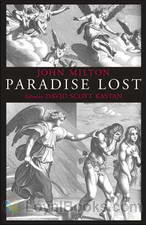 Paradise Lost
Paradise Lost
Magnificent in its scale and scope, this monumental poem by the blind poet John Milton was the first epic conceived in the English language. It describes an omniscient, all powerful God, the Fall of Man, the Temptation in the Garden of Eden, the disgraced angel who later becomes known as Satan, the Angelic Wars fought by Archangels Michael and Raphael and the Son of God who is the real hero of this saga. The poet John Milton was more than sixty years old when he embarked on this immense work of literary creation... | |
 Paradise Regained
Paradise Regained
Paradise Regained is a poem by the 17th century English poet John Milton, published in 1671. It is connected by name to his earlier and more famous epic poem Paradise Lost, with which it shares similar theological themes. Based on the Gospel of Luke’s version of the Temptation of Christ, Paradise Regained is more thoughtful in writing style, and thrives upon the imagery of Jesus’ perfection in contrast to the shame of Satan. | |
By: Andrew Lang (1844-1912) | |
|---|---|
 Myth, Ritual and Religion — Volume 1
Myth, Ritual and Religion — Volume 1
| |
 Tales of Troy: Ulysses the Sacker of Cities
Tales of Troy: Ulysses the Sacker of Cities
These are short stories about the life of Ulysses, the stealing of Helen, Paris, battles, Trojan horses, and more! | |
 John Knox and the Reformation
John Knox and the Reformation
| |
 Custom and Myth
Custom and Myth
CUSTOM AND MYTHINTRODUCTION.Though some of the essays in this volume have appeared in various serials, the majority of them were written expressly for their present purpose, and they are now arranged in a designed order. During some years of study of Greek, Indian, and savage mythologies, I have become more and more impressed with a sense of the inadequacy of the prevalent method of comparative mythology. That method is based on the belief that myths are the result of a disease of language, as the pearl is the result of a disease of the oyster... | |
By: Robert Michael Ballantyne (1825-1894) | |
|---|---|
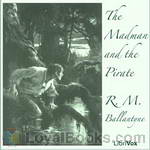 The Madman And The Pirate
The Madman And The Pirate
R. M. Ballantyne (April 24, 1825 – February 8, 1894) was a Scottish juvenile fiction writer. Born Robert Michael Ballantyne in Edinburgh, he was part of a famous family of printers and publishers. At the age of 16 he went to Canada and was six years in the service of the Hudson’s Bay Company. He returned to Scotland in 1847, and published his first book the following year, Hudson’s Bay: or, Life in the Wilds of North America. For some time he was employed by Messrs Constable, the publishers, but in 1856 he gave up business for the profession of literature, and began the series of adventure stories for the young with which his name is popularly associated. | |
 My Doggie and I
My Doggie and I
This story surrounds a child waif, a young woman, a young gentleman doctor, and an elderly lady. This tale unfolds the story of a bond that brings these unlikely friends together and merges their separate paths of life into one common path. The bond is "Dumps", or "Pompey", the "doggie". With many twists, turns, and uncertainties, the ending may surprise the reader. All's well that ends well in this doggie "tail". (Introduction by Allyson Hester) | |
By: Gustave Flaubert (1821-1880) | |
|---|---|
 The Temptation of St. Antony or A Revelation of the Soul
The Temptation of St. Antony or A Revelation of the Soul
| |
By: John Donne (1572-1631) | |
|---|---|
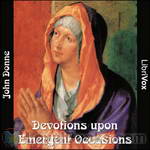 Devotions upon Emergent Occasions
Devotions upon Emergent Occasions
Devotions upon Emergent Occasions is a 1624 prose work by the English writer John Donne. It is a series of reflections that were written as Donne recovered from a serious illness, believed to be either typhus or relapsing fever. (Donne does not clearly identify the disease in his text.) The work consists of twenty-three parts describing each stage of the sickness. Each part is further divided into a Meditation, an Expostulation, and a Prayer. The seventeenth meditation is perhaps the best-known part of the work... | |
By: Samuel Taylor Coleridge (1772-1834) | |
|---|---|
 Confessions of an Inquiring Spirit and Some Miscellaneous Pieces
Confessions of an Inquiring Spirit and Some Miscellaneous Pieces
| |
By: Andrew Murray (1828-1917) | |
|---|---|
 The Ministry of Intercession A Plea for More Prayer
The Ministry of Intercession A Plea for More Prayer
| |
 Holy in Christ Thoughts on the Calling of God's Children to be Holy as He is Holy
Holy in Christ Thoughts on the Calling of God's Children to be Holy as He is Holy
In introducing this book, which Andrew Murray sub-titled “Thoughts on the Calling of God’s Children to Be Holy as He is Holy”, I can do no better than to quote from the author’s own Preface: “It has been my earnest desire that I might be a helper of the faith of my brethren in seeking to trace with them the wondrous revelation of God’s Holiness through the ages as recorded in His blessed Word. It has been my continual prayer that God might use what is written to increase in His children the conviction that we must be holy, the knowledge of how we are to be holy, the joy that we may be holy, the faith that we can be holy... | |
 Lord, Teach Us To Pray
Lord, Teach Us To Pray
| |
 'Jesus Himself'
'Jesus Himself'
Is it possible to be familiar with Jesus, to know the Bible, to be involved in church life, and yet not really know Jesus at all well? Andrew Murray, with his perceptive insights into the church of his day, and indeed of ours too, shows how this is all too often the condition of many believers. In the two essays comprising this book, Murray shows how we can move to a new place in really knowing Jesus, and how the presence of the Lord can become much more real to us. There is a cost, but God always abundantly rewards those who seek Him with their whole heart. | |
By: John Stuart Mill (1806-1873) | |
|---|---|
 Auguste Comte and Positivism
Auguste Comte and Positivism
Part 1 lays out the framework for Positivism as originated in France by Auguste Comte in his Cours de Philosophie Positive. Mill examines the tenets of Comte's movement and alerts us to defects. Part 2 concerns all Comte's writings except the Cours de Philosophie Positive. During Comte's later years he gave up reading newspapers and periodicals to keep his mind pure for higher study. He also became enamored of a certain woman who changed his view of life. Comte turned his philosophy into a religion, with morality the supreme guide. Mill finds that Comte learned to despise science and the intellect, instead substituting his frantic need for the regulation of change. | |
By: Sir John Barrow (1764-1848) | |
|---|---|
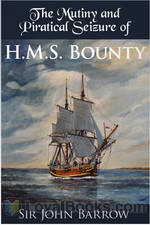 Eventful History of the Mutiny and Piratical Seizure of H.M.S. Bounty
Eventful History of the Mutiny and Piratical Seizure of H.M.S. Bounty
On December 31 1787, the HMS Bounty, a small sailing vessel embarked from Spithead Harbor, England bound for Tahiti. Her mission was sponsored by the Royal Society in London and aimed at picking up breadfruit plants and fruit from Tahiti and conveying them to the West Indies, where it was hoped they would take root and become a commercial crop. The Bounty was an old ship with a young captain and 46 young officers. The captain's cabin was converted into a potting shed for the expected breadfruit cargo... | |
By: Saint Thomas Aquinas (1225-1274) | |
|---|---|
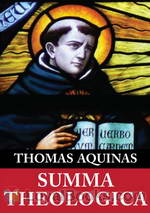 Summa Theologica, Pars Prima
Summa Theologica, Pars Prima
More than nine hundred years after it was first written, this unfinished work of a scholar saint still has the power to move our minds and hearts and set us thinking on the really important questions of life. Summa Theologica or simply the Summa as it is known, was written some time between 1265-74. It is a work that has had a profound and enduring influence on Western thought and literature. Designed to provide answers to Catholic theologians about the teachings of the Church, Thomas Aquinas' book instead goes far beyond its stated purpose... | |
By: Kate Douglas Wiggin | |
|---|---|
 The Old Peabody Pew: A Christmas Romance of a Country Church
The Old Peabody Pew: A Christmas Romance of a Country Church
A sweet, old fashioned Christmas romance set in an old New England meeting house. | |
By: Unknown | |
|---|---|
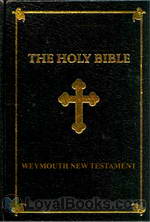 The Bible, Weymouth New Testament (WNT) - Matthew
The Bible, Weymouth New Testament (WNT) - Matthew
The Weymouth New Testament ("WNT"), otherwise known as The New Testament in Modern Speech or The Modern Speech New Testament, is a translation into "modern" English as used in the nineteenth century from the text of The Resultant Greek Testament by Richard Francis Weymouth from the Greek idioms used in it. It was later edited and partly revised by Reverend Ernest Hampden-Cook in London, England. Publishers: Baker and Taylor Company (New York) in 1903 and James Clarke & Co (London) in 1903.Richard Francis Weymouth's popular translation of the New Testament into English was first published in 1903 and has been in print through numerous editions ever since with millions of copies sold... | |
By: Thomas a Kempis (1380?-1471) | |
|---|---|
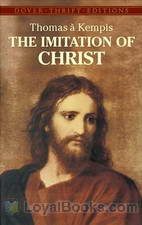 The Imitation of Christ
The Imitation of Christ
The Imitation of Christ is widely considered one of the greatest manuals of devotion in Christianity. The life of Christ is presented as the highest study possible to a mortal, as Jesus’ teachings far excel all the teachings of the saints. The book gives counsel to read the scriptures, statements about the uses of adversity, advice for submission to authority, warnings against temptation and how to resist it, reflections about death and the judgment, meditations upon the oblation of Christ, and admonitions to flee the vanities of the world. A recording of a Dutch translation of this work is also available (Thomas a Kempis was Dutch but wrote in Latin of course). | |
By: E.M. Berens | |
|---|---|
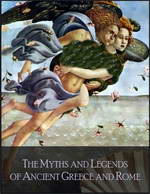 Myths and Legends of Ancient Greece and Rome
Myths and Legends of Ancient Greece and Rome
Silver footed, fair haired Thetis, Ares the God of War, Nike the Goddess of Victory, The Furies and The Muses, Zeus the presiding deity of the Universe and the magical, mysterious Olympus, are some of the amazing, mythical Greek and Roman deities you'll encounter in this book. Myths and Legends of Ancient Greece and Rome by EM Berens was originally intended for young readers. Written in an easy and light style, the author attempts to bring the pantheon of gods into a comprehensible format.... | |
By: Flavius Josephus (38?-100?) | |
|---|---|
 Against Apion
Against Apion
| |
By: Arthur Schopenhauer (1788-1860) | |
|---|---|
 The Essays of Arthur Schopenhauer; Religion, a Dialogue, Etc.
The Essays of Arthur Schopenhauer; Religion, a Dialogue, Etc.
| |
By: David Hume (1711-1776) | |
|---|---|
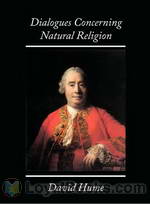 Dialogues Concerning Natural Religion
Dialogues Concerning Natural Religion
In Dialogues Concerning Natural Religion, philosopher David Hume examines whether belief in God can be rational. The work takes the form of a debate between three characters: Cleanthes, who argues that the existence and nature of God can be empirically verified; Demea, who argues that God is completely beyond human knowledge; and Philo, a philosophical skeptic widely thought to represent Hume’s own beliefs. Much of the debate centers around Cleanthes’ presentation of the analogical argument from design... | |